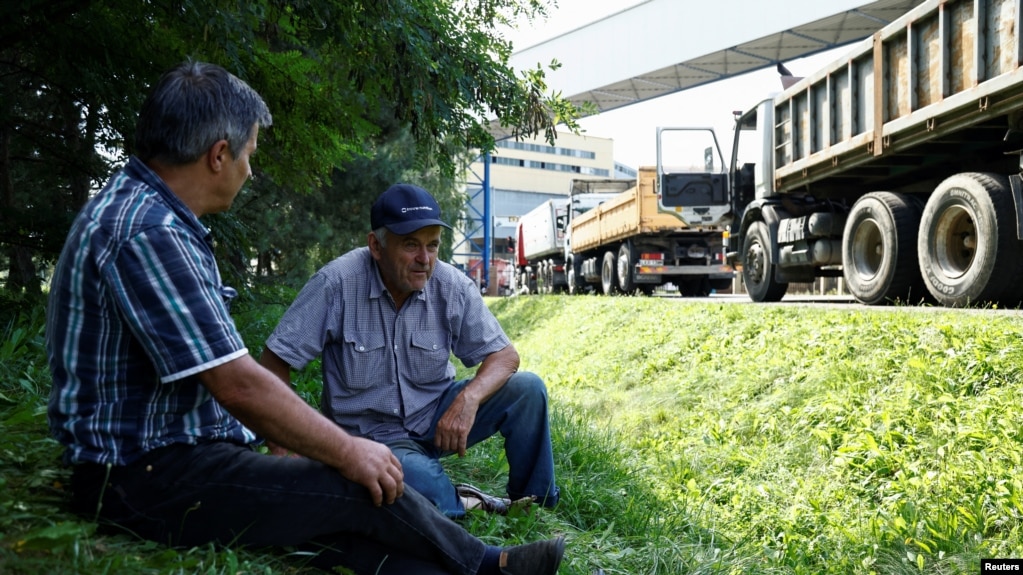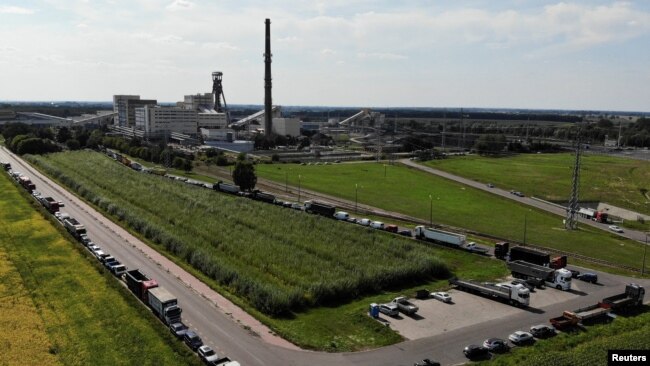In Poland, Where Coal is King, Homeowners Queue for Days to Buy Fuel
August 27, 2022
Reuters

August 27, 2022
Reuters

Truck drivers rest in the shade in front of the Bogdanka coal mine
while they wait for coal to be loaded, in Bogdanka, Poland, Aug. 26, 2022.
WARSAW/BOGDANKA, POLAND —
In Poland's late summer heat, dozens of cars and trucks line up at the Lubelski Wegiel Bogdanka coal mine, as people fearful of winter shortages wait for days to stock up on heating fuel in queues reminiscent of communist times.
Artur, 57, a pensioner, drove up from Swidnik, some 30 kilometers from the mine in eastern Poland on Tuesday, hoping to buy several tons of coal for himself and his family.
"Toilets were put up today, but there's no running water," he said, after three nights of sleeping in his small red hatchback in a crawling queue of trucks, tractors towing trailers and private cars.
"This is beyond imagination; people are sleeping in their cars. I remember the communist times, but it didn't cross my mind that we could return to something even worse."
Artur's household is one of the 3.8 million in Poland that rely on coal for heating and now face shortages and price hikes, after Poland and the European Union imposed an embargo on Russian coal following Moscow's invasion of Ukraine in February.
Poland banned purchases with an immediate effect in April, while the bloc mandated fading them out by August.
While Poland produces over 50 million tons from its own mines every year, imported coal, much of it from Russia, is a household staple because of competitive prices and the fact that Russian coal is sold in lumps more suitable for home use.
Soaring demand has forced Bogdanka and other state-controlled mines to ration sales or offer the fuel to individual buyers via online platforms, in limited amounts. Artur, who did not want to give his full name, said he had collected paperwork from his extended family in the hope of picking up all their fuel allocations at once.
The mine planned to sell fuel for some 250 households Friday and would continue sales over the weekend to cut waiting times, Dorota Choma, a representative for the Bogdanka mine told Reuters.
The limits are in place to prevent hoarding and profiteering, or even selling spots in the queue, Choma said.

WARSAW/BOGDANKA, POLAND —
In Poland's late summer heat, dozens of cars and trucks line up at the Lubelski Wegiel Bogdanka coal mine, as people fearful of winter shortages wait for days to stock up on heating fuel in queues reminiscent of communist times.
Artur, 57, a pensioner, drove up from Swidnik, some 30 kilometers from the mine in eastern Poland on Tuesday, hoping to buy several tons of coal for himself and his family.
"Toilets were put up today, but there's no running water," he said, after three nights of sleeping in his small red hatchback in a crawling queue of trucks, tractors towing trailers and private cars.
"This is beyond imagination; people are sleeping in their cars. I remember the communist times, but it didn't cross my mind that we could return to something even worse."
Artur's household is one of the 3.8 million in Poland that rely on coal for heating and now face shortages and price hikes, after Poland and the European Union imposed an embargo on Russian coal following Moscow's invasion of Ukraine in February.
Poland banned purchases with an immediate effect in April, while the bloc mandated fading them out by August.
While Poland produces over 50 million tons from its own mines every year, imported coal, much of it from Russia, is a household staple because of competitive prices and the fact that Russian coal is sold in lumps more suitable for home use.
Soaring demand has forced Bogdanka and other state-controlled mines to ration sales or offer the fuel to individual buyers via online platforms, in limited amounts. Artur, who did not want to give his full name, said he had collected paperwork from his extended family in the hope of picking up all their fuel allocations at once.
The mine planned to sell fuel for some 250 households Friday and would continue sales over the weekend to cut waiting times, Dorota Choma, a representative for the Bogdanka mine told Reuters.
The limits are in place to prevent hoarding and profiteering, or even selling spots in the queue, Choma said.

Cars and trucks queue for more than a kilometer to pick up coal in front of the Bogdanka mine in Bogdanka, Poland, Aug. 26, 2022.
Like all Polish coal mines, Bogdanka typically sells most of the coal it produces to power plants. Last year, it sold less than 1% of its output to individual clients so it lacks the logistics to sell fuel directly to retail buyers.
Lukasz Horbacz, head of the Polish Coal Merchant Chamber of Commerce, said the decline in Russian imports began in January when Moscow started using rail tracks for military transport.
"But the main reason for the shortages is the embargo that went into immediate effect. It turned the market upside down," he told Reuters.
A spokesperson for the Weglokoks, a state-owned coal trader tasked by the government to boost imports from other countries declined to comment, while the climate ministry was not available for comment. Government officials have repeatedly said Poland would have enough fuel to meet demand.
In recent years, Poland has been the most vocal critic of EU climate policy and a staunch defender of coal that generates as much as 80% of its electricity. But coal output has steadily declined as the cost of mining at deeper levels increases.
Coal consumption has held mostly steady, prompting a gradual rise in imports. In 2021, Poland imported 12 million tons of coal, of which 8 million tons came from Russia and were used by households and small heating plants.
In July, Poland ordered two state-controlled companies to import several million tons of the fuel from other sources including Indonesia, Colombia and Africa, and introduced subsidies for homeowners facing a doubling or tripling of coal prices from last winter.
"As much as 60% of those that use coal for heating may be affected by energy poverty," Horbacz said.
Back at Bogdanka, Piotr Maciejewski, 61, a local farmer who joined the queue Tuesday, said he was prepared for a long wait.
"My tractor stays in line, I'm going home to get some sleep," he said.
Like all Polish coal mines, Bogdanka typically sells most of the coal it produces to power plants. Last year, it sold less than 1% of its output to individual clients so it lacks the logistics to sell fuel directly to retail buyers.
Lukasz Horbacz, head of the Polish Coal Merchant Chamber of Commerce, said the decline in Russian imports began in January when Moscow started using rail tracks for military transport.
"But the main reason for the shortages is the embargo that went into immediate effect. It turned the market upside down," he told Reuters.
A spokesperson for the Weglokoks, a state-owned coal trader tasked by the government to boost imports from other countries declined to comment, while the climate ministry was not available for comment. Government officials have repeatedly said Poland would have enough fuel to meet demand.
In recent years, Poland has been the most vocal critic of EU climate policy and a staunch defender of coal that generates as much as 80% of its electricity. But coal output has steadily declined as the cost of mining at deeper levels increases.
Coal consumption has held mostly steady, prompting a gradual rise in imports. In 2021, Poland imported 12 million tons of coal, of which 8 million tons came from Russia and were used by households and small heating plants.
In July, Poland ordered two state-controlled companies to import several million tons of the fuel from other sources including Indonesia, Colombia and Africa, and introduced subsidies for homeowners facing a doubling or tripling of coal prices from last winter.
"As much as 60% of those that use coal for heating may be affected by energy poverty," Horbacz said.
Back at Bogdanka, Piotr Maciejewski, 61, a local farmer who joined the queue Tuesday, said he was prepared for a long wait.
"My tractor stays in line, I'm going home to get some sleep," he said.
AFP
Published August 27, 2022
Poland uses 10 million tons of coal annually to heat households – a whopping 87 percent of all coal used in EU households in 2019.
According to an independent think tank, Warsaw-based Forum Energii, about half of this is extracted domestically, while Russia used to make up about 40 percent, or 3.9 million tons a year.
However, Poland and the European Union imposed an embargo on Russian coal following Moscow’s invasion of Ukraine in February. That means about 3.8 million homes in Poland that rely on coal for heating in the winter are now facing shortages and price hikes.
Reuters reports that even now, in Poland’s late summer heat, dozens of cars and trucks line up at the Lubelski Wegiel Bogdanka coal mine, as householders fearful of winter shortages wait for days and nights to stock up on heating fuel in queues reminiscent of communist times.
Artur, 57, a pensioner, drove up from Swidnik, some 30 km (18 miles) from the mine in eastern Poland on Tuesday, hoping to buy several tonnes of coal for himself and his family.
“Toilets were put up today, but there’s no running water,” he said, after three nights of sleeping in his small red hatchback in a crawling queue of trucks, tractors towing trailers, and private cars.
“This is beyond imagination, people are sleeping in their cars. I remember the communist times but it didn’t cross my mind that we could return to something even worse.”
Energy discontent and coal shortages
It may seem hard to believe that in coal-rich Poland, some 3 million households are facing a winter of energy discontent as the coal shortage grows and prices soar.
But there is a very good explanation for what is happening in Poland. It began back when Poland reluctantly agreed to phase out coal in order to meet the EU’s carbon emissions targets. In November 2021, Poland also made a pledge to the COP26 Climate Conference in Glasgow to exit coal and stop building or investing in new capacity, according to Deutsche Welle.
Polish coal is expensive to mine because it is buried so deep, this making Russian coal much more affordable, and it is sold in lumps more suitable for home use.
Aleksandra Gawlikowska-Fyk of Forum Energii said Russian coal is also used by heating plants in the eastern part of Poland where it cannot be simply swapped for Polish coal. Russian coal is of higher quality containing less sulfur, she told DW.
Read more: https://www.digitaljournal.com/world/poland-faces-a-winter-of-discontent-as-energy-poverty-looms/article#ixzz7dFeex4B1

No comments:
Post a Comment